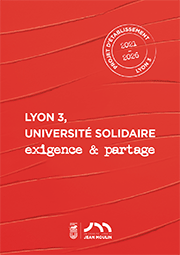AccueilRechercheLes productions scientifiquesThèsesThèses soutenuesThèses soutenues - 2021
-
Partager cette page
- Recherche,
DELOBRE Anne-Sophie
L’arbitrage familial international
Publié le 25 mars 2021 – Mis à jour le 25 mars 2021
Thèse en Droit, soutenue le 22 janvier 2021.
Comment évoquer un tel sujet sans s’émouvoir d’un antagonisme certain ? Les spécialistes du droit de la famille, conscients de l’importance de l’indisponibilité des droits, de la place de l’ordre public en la matière, des enjeux de protections des personnes concernées, sont souvent réticents à penser au concept de l’arbitrage familial international. A l’inverse, les spécialistes de l’arbitrage, habitués aux vertus du système, s’empressent de promouvoir « l’arbitrage pour tous » afin de conquérir un nouveau marché et répondre à une nouvelle demande. Ainsi, un dilemme naît : les litiges familiaux internationaux sont-ils arbitrables ? Dans une telle hypothèse comment pourrait être mis en œuvre l’arbitrage familial international ? C’est un sujet d’actualité, controversé, qui repose sur une idée qui n’est pas novatrice : sa vulgarisation sur la scène internationale ne serait pas une révolution. Il n’en demeure pas moins qu’une prudence s’impose dans une matière aussi sensible que le droit international de la famille. Face à la contractualisation croissante du droit de la famille, une voie médiane, pragmatique, d’un arbitrage familial international pourrait s’organiser par l’insertion d’une convention d’arbitrage dans les contrats internationaux de droit de la famille avant tout litige pour anticiper, organiser, les points épineux et éviter de douloureux procès.
Mots-clés : Arbitrage – familial – famille – international – internationalité – litige – arbitrabilité – ordre public – droits indisponibles – convention d’arbitrage – sentence arbitrale – tribunal arbitral.
This dissertation addresses an issue that cannot be discussed without provoking concerns stemming from an indubitable antagonism. Family law specialists, who are aware of the importance of the unavailability of family-related rights, of the role of public policy rules in this area, and of the challenges involved in the protection of the persons concerned, are often reluctant to consider the concept of international arbitration in family matters. Conversely, arbitration specialists, who are familiar with the virtues of this procedure, are keen to promote “arbitration for all” in order to enter a new market and address a new demand. This gives rise to a dilemma: can family-related disputes be subject to arbitration? If so, how could arbitration procedures be implemented in this area? This is a current and topical issue, relying on an idea that is not novel: its general application on the international scene would not amount to a revolution. It remains however that caution must prevail in an area as sensitive as international family law. While family law is increasingly dominated by a contractual approach, a median and pragmatic solution might favour international family arbitration through the insertion of an arbitration clause in international family law contracts prior to any dispute in order to anticipate any thorny issue that might arise and organise its resolution, thus avoiding painful litigation.
Keywords : Arbitration – familial – family – international – internationality – litigation – arbitrability – public policy - unavailable rights - arbitration agreement – arbitration decision – arbitral court
Directeur(trice) de thèse : Alain DEVERS
Membres du jury :
M. Alain DEVERS, Directeur de thèse, Professeur des universités, Université Jean Moulin Lyon 3,
Mme Estelle GALLANT, Rapporteure, Professeure des universités, Université Toulouse 1 Capitole,
M. Michel FARGE, Rapporteur, Professeur des universités, Université Pierre Mendès France, Grenoble,
M. Cyril NOURISSAT, Professeur des universités, Université Jean Moulin, Lyon 3.
Président(e) du jury : Cyril NOURISSAT
Documentation
Mise à jour : 25 mars 2021



